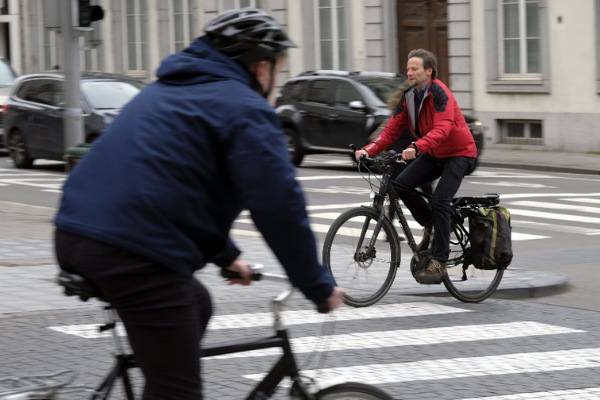Belgium is setting aside €240 million to boost cycling as a way to commute between home and the workplace, announced Federal Mobility Minister Georges Gilkinet.
Gilkinet launched the first federal action plan to promote cycling, called 'Be Cyclist' in September – the first time ever that the Federal Government made promoting cycling an official and common objective.
"Today, I am pleased to give concrete shape to a central point of this plan, namely encouraging people to use their bicycles to commute to work," said Gilkinet in a press release, adding that over the next three years, €240 million will be made available for active mobility.
One of the 52 measures in the 'Be Cyclist' plan states that the government wants to encourage more people to choose to cycle to work. According to the latest figures available, 11% of employees cycle to work every day, and 30% do so once a week.
In Belgium, 571,000 employees already receive a mileage allowance of €289 on average for this commuting. Now that in the framework of the budget control of 1 April, €240 million euro is made available for the next three years, Minister Gilkinet wants to shift up a gear to encourage more employees to get on their bikes.
"If more employees cycle, this is especially good for our economy: traffic jams cost a lot of money and it is also an important economic sector in our country," he said.
Cycling has a positive impact on absenteeism, physical health and mental well-being, Gilkinet stressed. "Cycling makes you happy and gives you a lot of freedom. And of course, cycling is good for the climate, as an alternative to fossil fuel transport."
In light of the current energy crisis, he also stressed that this is an important step towards the energy independence that Belgium is striving for.
Gilkinet is also engaging in dialogue with unions and other social partners to be able to submit concrete proposals to encourage employees to cycle to work, he announced.
"We want to support the choice for active and sustainable mobility, for example, by increasing the mileage allowance or by expanding the number of sectors that grant the allowance," Gilkinet said. "Cycling, walking and taking the train: that is part of the solution to living better today, and to leave future generations a more sustainable earth."

